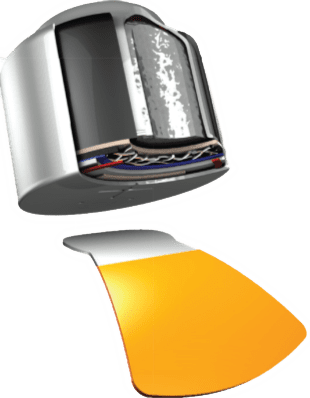Starting at university can seem like a daunting prospect to some.
Hearing loss can seem like another obstacle in the way. We spoke to Jacki Andre, an advocate for disability rights with a wealth of university experience.
I had no idea about my life path when I was in high school. (Who am I kidding? I still have no idea about my life path!) I was a good student. I earned high marks and I even won a scholarship. It seemed like a given that I would go to university. But I’m hard of hearing and I floundered to figure things out. Could I handle university, given my hearing? And if I could manage the studies and succeed, how would I fare afterwards, in the career that I had studied for?
But I felt like my options would be super limited without any post-secondary education, and so I enrolled in a liberal arts program at my local university. I ended up earning both a B.A. and a M.A there. (Yes, I succeeded!)
After I finished my studies, I tried a few different jobs before settling into my current career: program coordinator at my alma mater’s accessibility office. Yep, I arrange accommodations for students who face the same questions and issues that I did.
Let me tell you: I know university can be scary. I worried about all kinds of things, like:
- The classes are so big! If I tell the instructors about my needs, will they remember who I am in that sea of faces?
- Will I be able get a seat where I can hear okay and/or lipread?
- Will I be expected to listen to podcasts or watch uncaptioned videos?
- Will the instructor be willing to wear a FM mic?
- Will I have to do group work and explain to the other students that I’m hard of hearing?
But let me tell you this too: if I could do it, so can you!
Each person experiences hearing loss differently. Not only does the level of our hearing vary, but the supports that work best for each person and/or the supports that each person prefers to use differ too. There are lots of different accommodations available for university or college students who are hard of hearing. Some will work better for you than others. Don’t be shy about trying them all to find the ones that are best for you.

Register with your Student Support Offices
In primary and high school, we typically don’t have to explain our needs to each teacher or advocate for ourselves. Instead, in conversation with our parents, the school creates an Individualized Education Plan (IEP) for teachers and administrators to follow.
It’s different in university. The school doesn’t notify your instructors about your needs. Students must be proactive and take charge of their own accommodations. There is a benefit to this: you can pick and choose which supports to use.
The first step is to contact the office at your school that provides accommodations. It might be called something like “Disability Services for Students” or the “Centre for Accessible Education” or “Access and Equity Services.” Each institution and accessibility office has different policies, but usually you need to present some sort of documentation in order to register with the office. Once you’re registered, the staff there will let you know what kind of supports are available for you. They will also explain what you need to do in order to utilize those supports.
Talk to your Instructors
In university, you will have a LOT of different instructors and you will need to advocate for yourself with each one. What does that mean?
Because universities don’t create IEPs, instructors aren’t notified by the school about a student’s accommodation needs. Students usually need to tell each instructor themselves. Most schools have a process in place to make that easier.
At my school, students request letters for their instructors with a few simple clicks in their online student accounts. The letters don’t state a diagnosis, but they do list the accommodations that the student needs. Students give those letters to their instructors and we encourage them to have a conversation with their instructors as well. Don’t be shy!
Instructors understand that, by law, accommodations must be provided. They know that assisting you is part of their jobs. As well, many instructors will go above and beyond what’s required. When I explained to one professor that I supplemented my hearing with lipreading, he offered to shave off his mustache so that I could see his lips better!

Ask about Peer Notetaking Programs
In university, classes are usually designated as “lectures.” A class might also have a lab and/or tutorial section, where students do practical work (labs) or discuss the material (tutorials). However, for the most part, during the actual classes, instructors just lecture. As they talk, students take notes.
Taking notes can be tough when you’re hard of hearing! You may have a hard time understanding when there’s background noise or you may have trouble lipreading and writing at the same time.
However, it’s pretty standard for postsecondary schools to offer notetaking services.
Your accessibility services office will find a student in the same class who is willing to share their notes. This is usually a confidential service. The student who provides notes won’t know who the notes are for, or why they’re needed. At my school, notes are uploaded to a cloud-type service, so that students can access them from anywhere at any time.

There’s all kinds of technology that’s useful for people with hearing loss and new devices and apps are developed all the time. Here are some types of technological support that your school may be able to provide right now (and likely new, exciting ones are on the way):
LiveScribe SmartPen
The LiveScribe SmartPen records audio that is synced with handwritten notes. When the pen is touched to a word written on special paper, the audio linked to that word begins to play. SmartPens are a good option for people who benefit from amplified audio. My school has SmartPens for loan and can also help students access government grants to buy their own.
FM Systems
Some (but usually not all) university classrooms have FM systems built-in and available for all students to use. If you would benefit from classroom amplification, your accessibility services office will make sure your classes are booked into the right rooms.
If you have your own personal FM system, of course that can be used in any classroom. Some instructors may be new to using FM systems and may need some help figuring things out. Your accessibility services office will likely have an instruction sheet that can be printed and shared as needed.
CART, TypeWell, and Other Real-Time Captioning Services
If you require real-time captioning, your school will set that up for you. Services like CART and TypeWell are often provided remotely. Lectures are streamed online, and a transcriber listens in, typing the proceedings verbatim in real time. That transcript is sent to your device (laptop, tablet, smartphone) as it’s created so that you can follow along in the classroom.
Apps
I myself use voice-to-text recognition software in some situations. In my experience, it’s not terribly accurate yet; hopefully it will continue to improve. That said, it can help me if I lose the thread of a conversation or if I need to fill in some blanks. I use an app called “Ava” for small group discussions and Ava might also work well in tutorials or group-work situations.
Investigate other Accommodations
There are a few other accommodations that your accessibility services office may be available to provide, depending on your needs.
Exam Accommodations can benefit hard of hearing students in certain situations. For instance, if your exam has an oral component (which is often the case for second language classes, like French or Spanish), your accessibility services office can help make that work for you.
As well, sometimes final exams are written in large communal spaces, like gyms, where several different classes write exams at the same time. It can be tough for hard of hearing students to hear verbal instructions in those kinds of situations or to manage their hearing aids in those cavernous spaces. If you need help with exams scheduled in this way, talk to your accessibility services office.
Residence Accommodations may be needed if you plan to live in your school’s dormitory. Flashing fire alarms are standard in communal spaces. But, typically, only a few dorm rooms are designated as “accessible” and outfitted with the safety devices that hard of hearing students need. If you will be living in residence, notify your school’s accessibility services office and its residence office when you apply for a room so that you are assigned a safe, comfortable space.

Yes, going to university can be daunting when you’re hard of hearing! But if you’re in touch with your accessibility services office, if you’re proactive, and if you’re willing to try different accommodations to see which ones work best for you, you’ll set yourself up for success. And success at university can send you hurtling up your own life path, with a clear destination in view.
Why not read our article ‘Back to Uni‘ for some extra tips for students?

